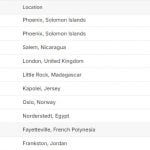Exploring Shopware: ID, Account, & Other Basic Steps

The following article continues our exploration. This time, we’ve come a little bit closer to the platform’s admin and storefront functionalities. In the following material, you will learn what a Shopware account is and how to create it. Note that it is a place that exists apart from the admin section. In a nutshell, it is a central hub where all services related to the Shopware operation take place. For instance, you can view your current license, get information about support, or list and maintain extensions used on your e-commerce storefront there. Besides, we define the Shopware ID and master data.
Other topics discussed below include Shopware payment methods, making purchases in Shopware, and topping up your Shopware account. We also explain how to add a shop in Shopware or how to create a new payment method in your Shopware account. Purchasing Shopware extensions is also described below. And note that you can always get support with your Shopware account, license, and products. This process is explained below.

And if you are interested in connecting your e-commerce storefront to other systems, you’ve come to the right place. The Firebear team provides Shopware integration with external platforms. Contact our support for further information or try our Improved Import & Export Extension for Shopware.
Table of contents
- 1 How to create a Shopware ID
- 2 How to create a Shopware account
- 3 How to purchase Shopware extensions
- 4 How to get support with a Shopware account, license, and products
- 5 How to Import Any Data to Shopware 6
- 6 Shopware 6 Essentials FAQ
- 6.1 How to create a Shopware ID?
- 6.2 How to create a Shopware account?
- 6.3 What is Shopware master data?
- 6.4 How to add a shop in Shopware?
- 6.5 How to add a payment method in Shopware?
- 6.6 How to create a deposit in Shopware?
- 6.7 How to purchase Shopware extensions?
- 6.8 How to get support in Shopware?
- 6.9 How to migrate to Shopware 6?
- 6.10 How to automate import and export processes in Shopware 6?
- 6.11 How to integrate Shopware 6 with external systems?
How to create a Shopware ID
Let’s look at how to create a Shopware ID. Before going any further, we’d like to define what it is. Shopware ID is a central login ID for numerous points across the Shopware ecosystem. For instance, it is utilized to log in to a Shopware account. At the same time, you cannot buy anything without your Shopware ID in the Shopware store. Posting and reading content on the Shopware forum also requires this credential. Besides, there are various Shopware portals where you can use your Shopware ID to confirm your identity.
Along with your Shopware ID, the system enables you to streamline the user administration for similar purposes. Follow these steps if you still don’t do that:
- Log in with your Shopware ID;
- Switch to a personal user account.
Now, you can use a more modern way to inform the system about who you are.
To get a Shopware ID, you need to create a Shopware account. We describe this procedure in the following chapter.
How to create a Shopware account
Creating a Shopware account is a user-friendly process that involves some data entry routine. It doesn’t differ much from other similar procedures. Follow these steps to register a Shopware account:
- Visit this page: .

- Click on the “Register now” link.
- Fill in the required fields that display on the right-hand side of the page:
- Specify your email address;
- Create a strong password;
- Type an account title;
- Add your first and last name;
- Choose a preferable language.
- Click on “Register” – this action transfers the provided information to the system, creating your Shopware account.

- You will get an email with the registration confirmation. Follow the link provided there.

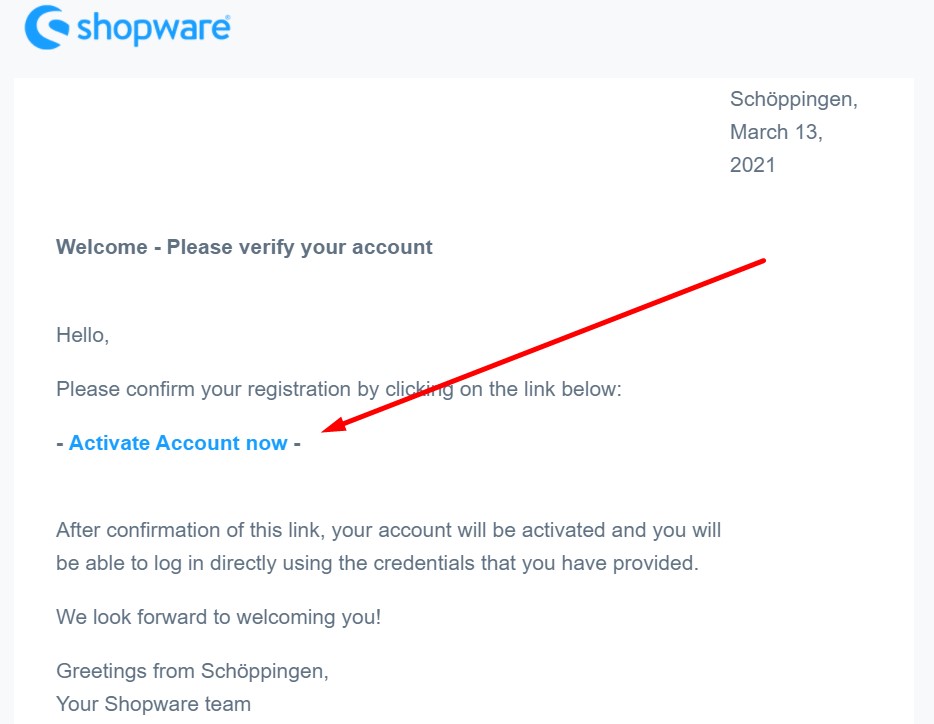
Now, you can log in to Shopware with the provided credentials. Proceed to to open your new Shopware account.
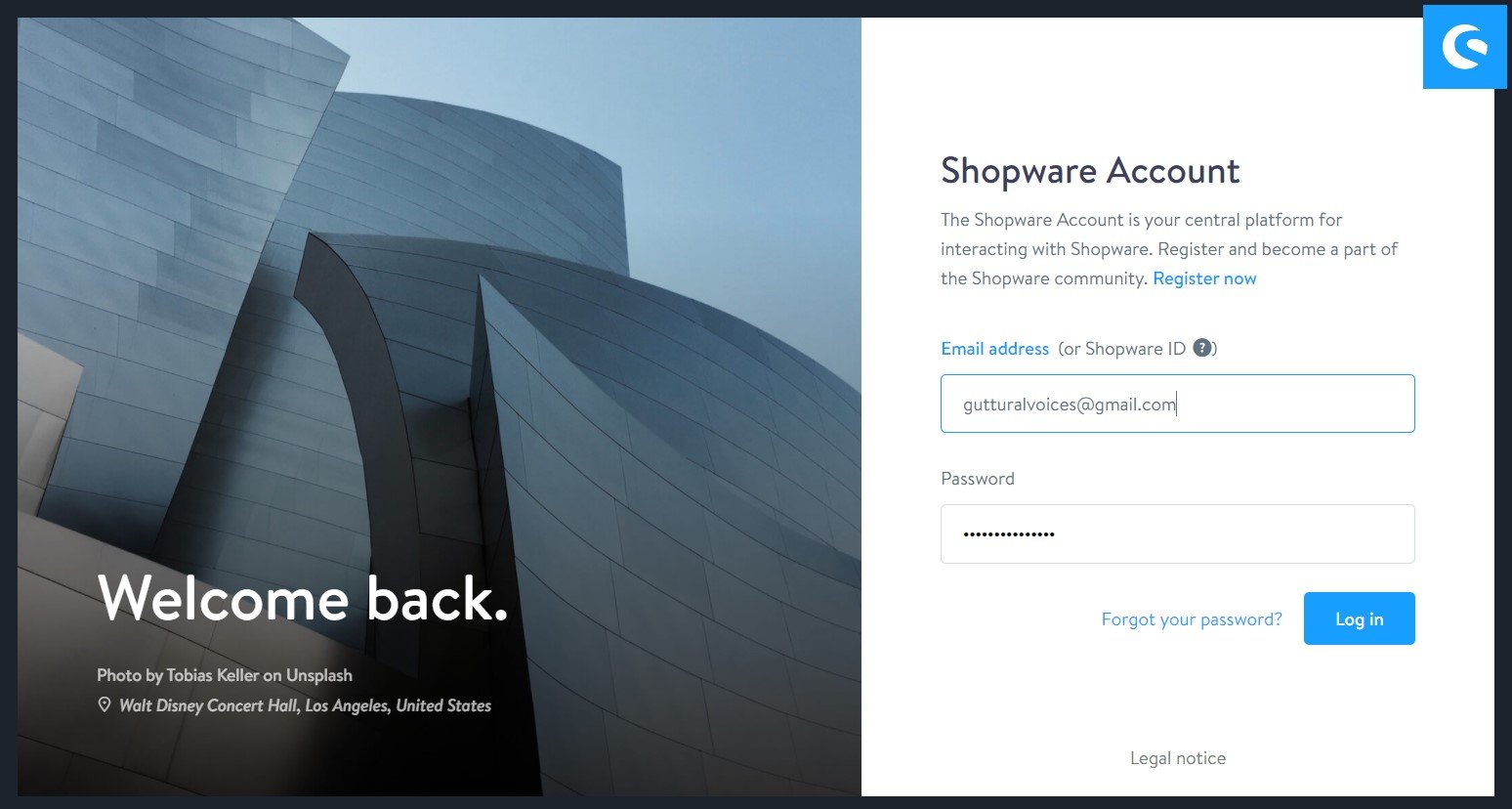
The first login attempt is associated with further data entry. You need to provide additional information about yourself. After that, the basic setup is complete.
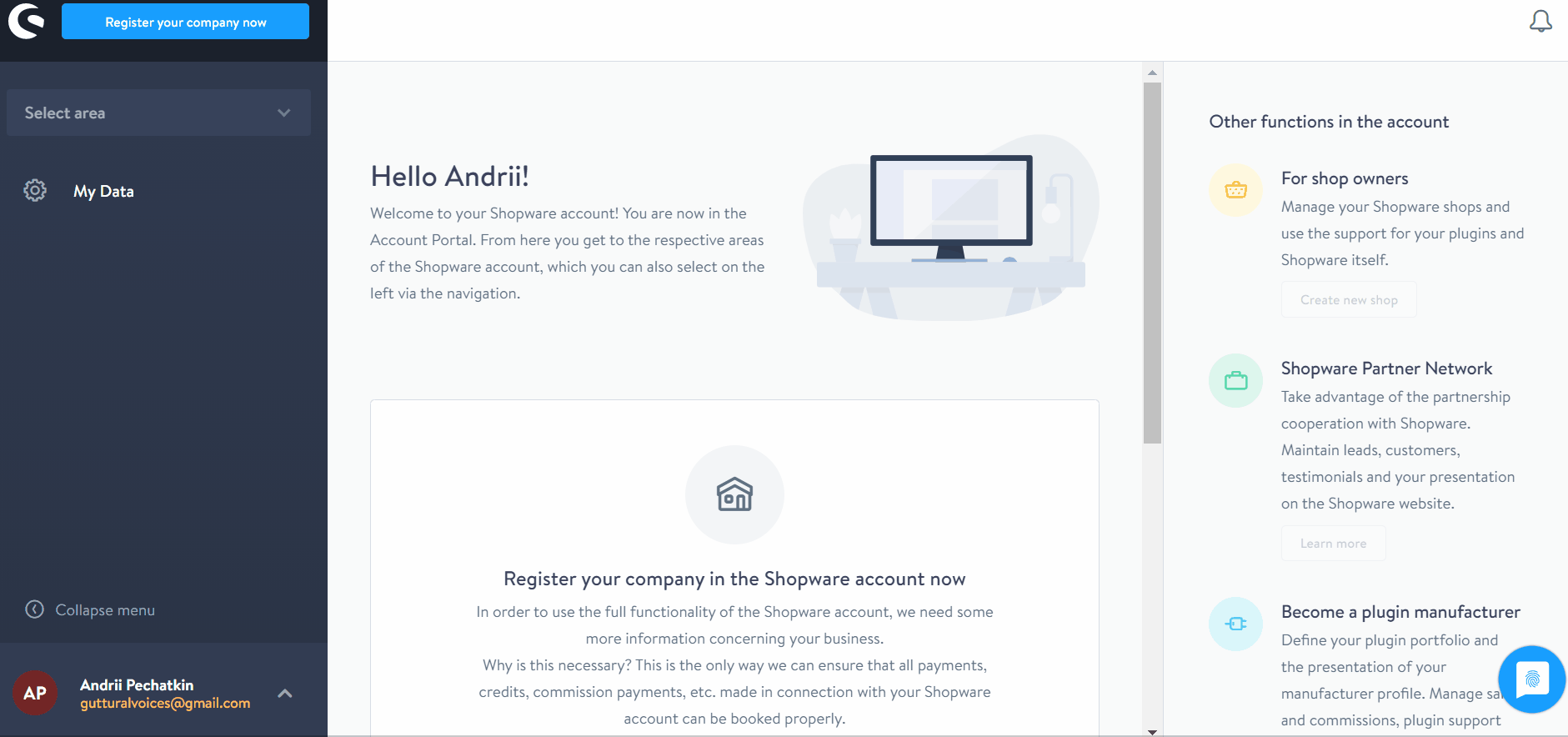
Shopware Master Data
Let’s proceed to the next stage. As we’ve just mentioned above, it is necessary to complete the registration, providing master data. Please provide only complete and correct information. Shopware requires the following data:
- Address;
- Email;
- Telephone number;
- Company name, etc.
Also, you need to register your company. Firstly, it is necessary to provide your company name and agree to terms and conditions.
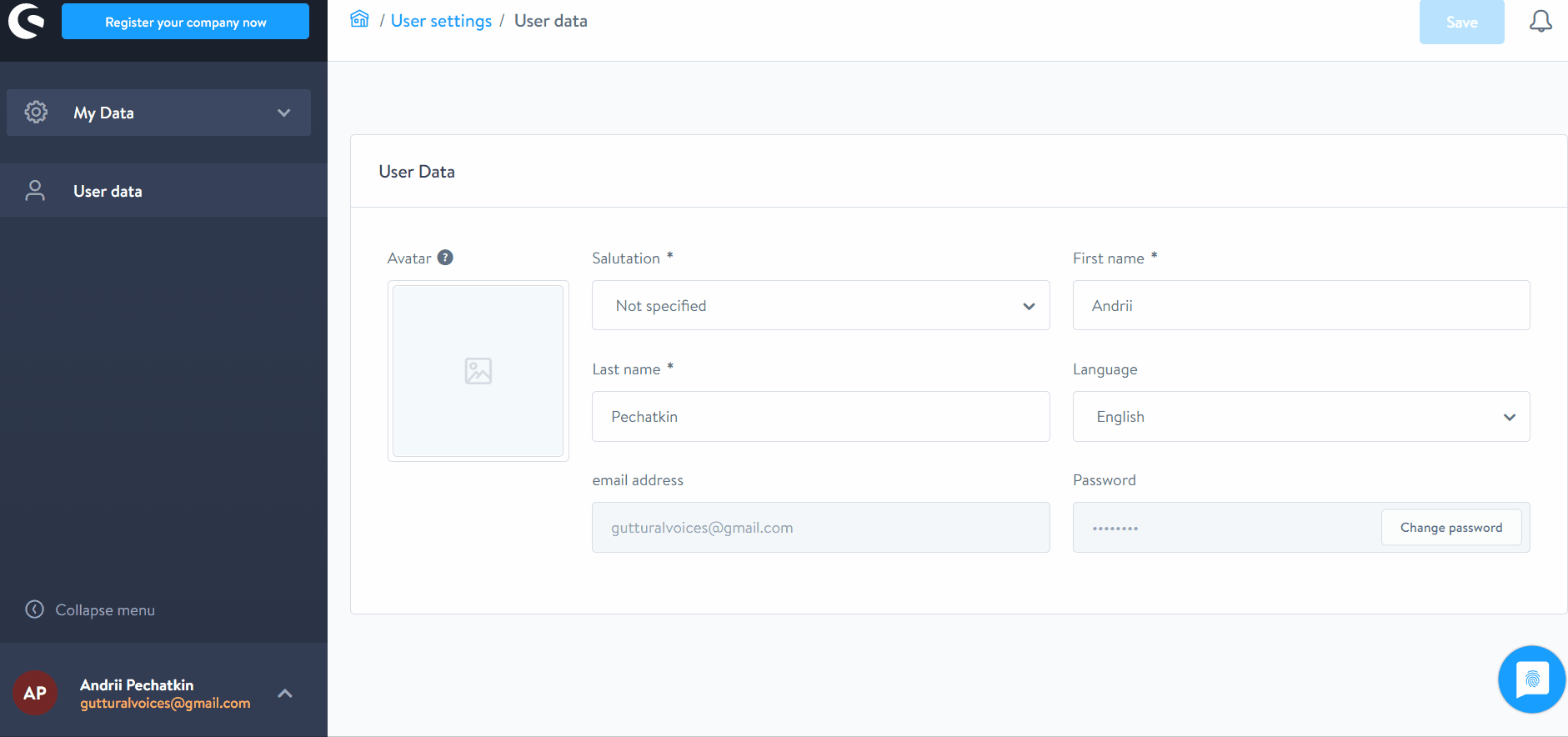
Secondly, type the account information, contact data, and billing address.
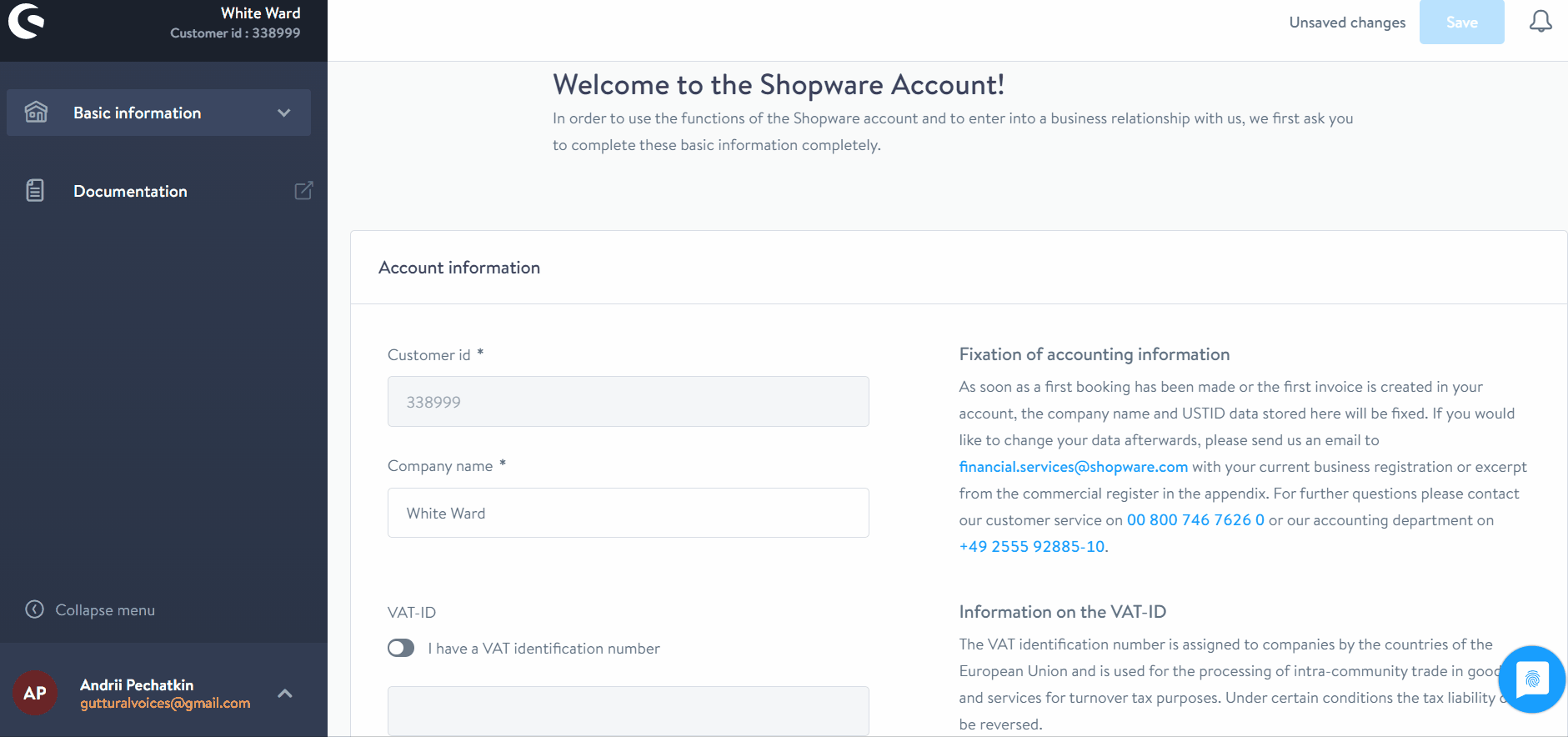
Note that Shopware requires a correct company name from your business registration documents. Using a trading name in business transactions requires additional indication. The official guide refers to the following example: «instead of “Max Mustermann” then “XYZ-Products, Inh. Max Mustermann”».
It is also vital not to mix client and agency data. Usually, agencies tend to make such mistakes. However, information from different sources should be held separately.
If you run a company in the EU outside Germany, it is necessary to follow specific requirements. Otherwise, you will have to do some additional work to run your Shopware website properly. The system requires a correct VAT ID. If you provide it, Shopware lets you issue net invoices instead of gross invoices.
What if the provided master data has any inconsistencies? The only way to remove the issue is to contact Customer Care or Financial Services and ask for further resolution.
Also, note that a customer number is output on documents using the following combination: XXXXXX+XX. The first six characters are the customer ID, while the last two digits display the following information:
- 00 – for a manually created invoice;
- 01, 02,03… – for a reference to a specific domain.
How to add a shop in Shopware
Now, you have to create a shop in Shopware and link its domain to your Shopware account. It will help you use licensed plugins. The only way to install them takes place in your account. Since your e-commerce shop and account are linked, you control their installation on a website through your Shopware account.
To create a new shop in Shopware, follow these steps:
Proceed to the merchant area. Click the corresponding link in the right section of your start-screen.
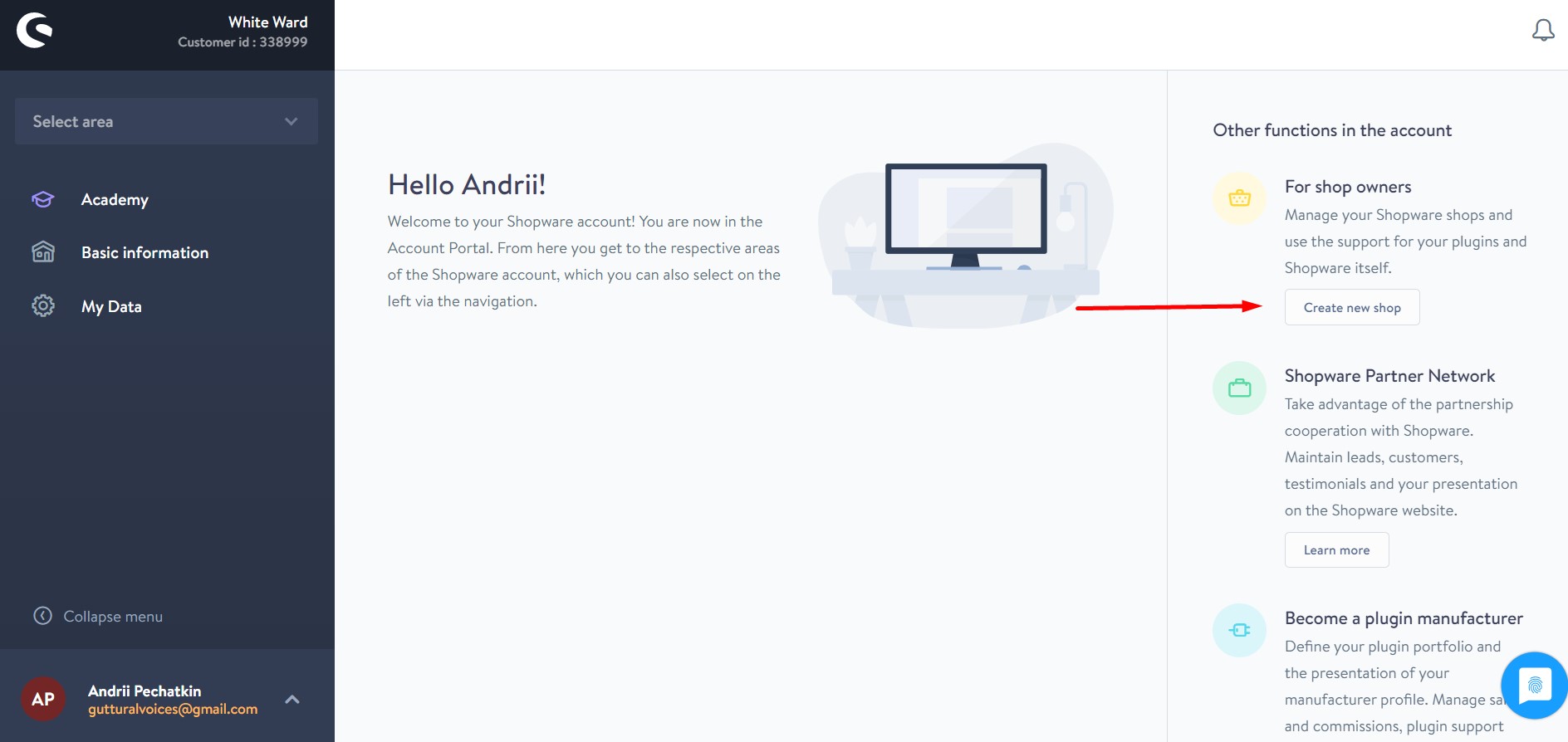
You can either create a cloud storefront or register an existing on-premise Shopware website.
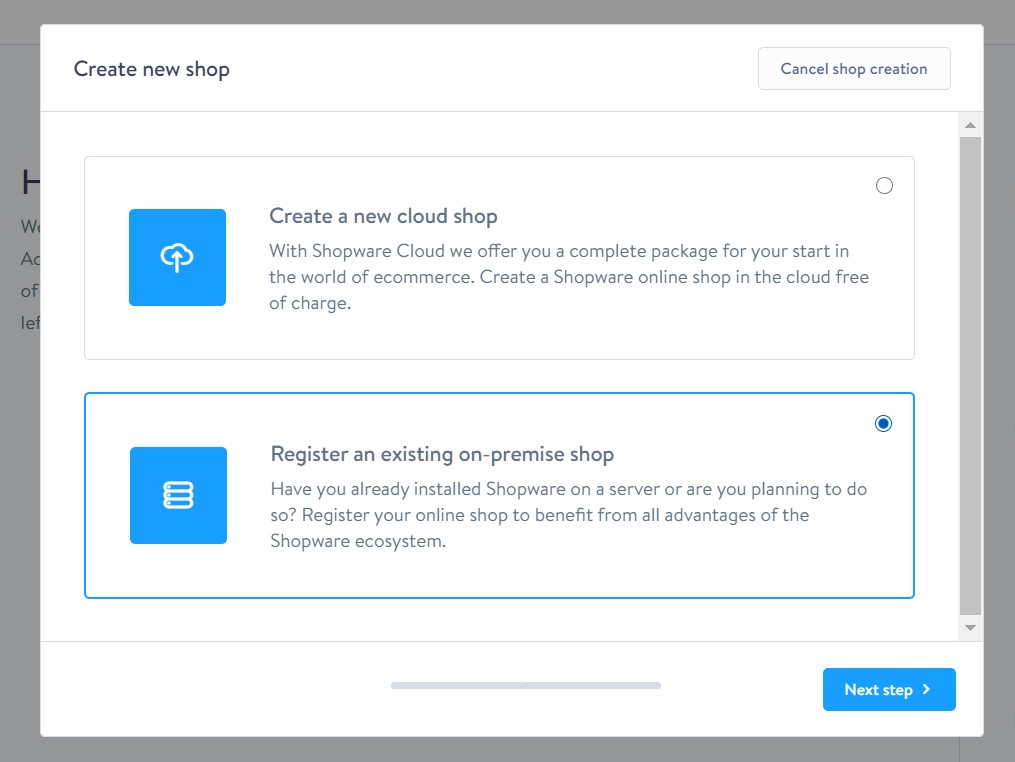
The registration window for an existing self-hosted shop looks as follows:
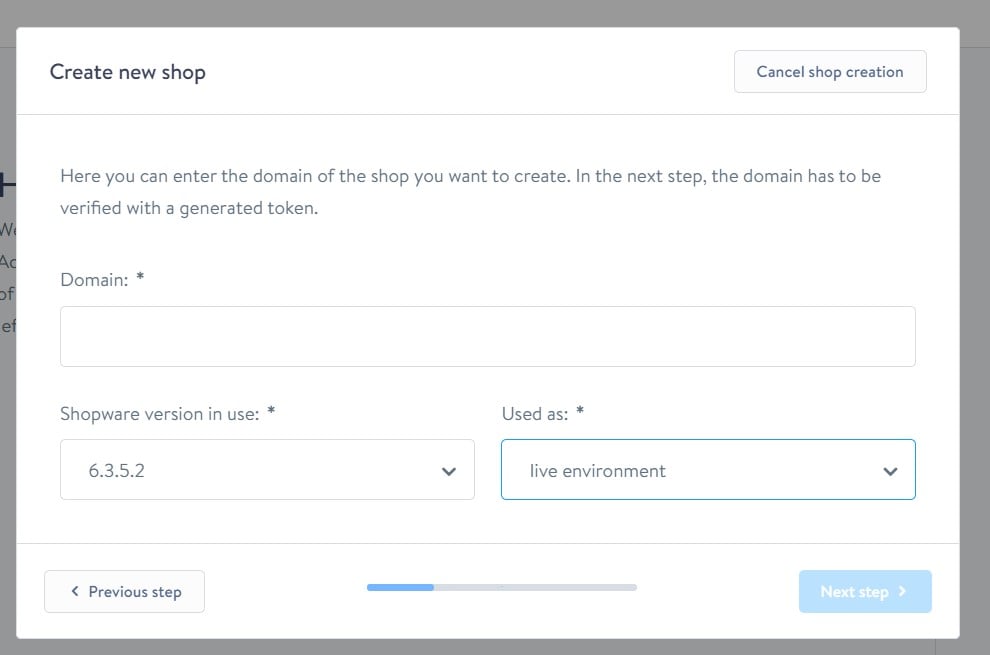
You need to specify your Shop domain, choose the Shopware version of your store, and indicate the purpose of use. It can be either a productive or test environment.
The following window displays information on the validation of the shop domain:
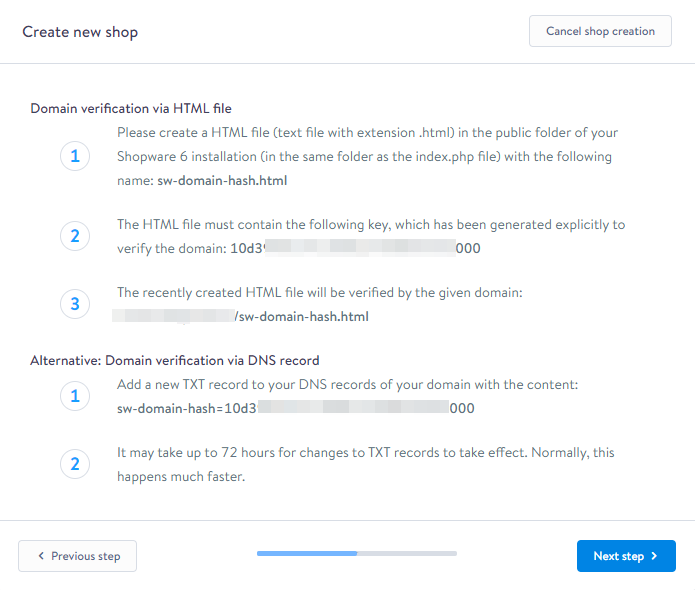
From that screen, you can move to the next step. Hit the corresponding button on the bottom right part of the screen.
Important Notice! It is highly recommended to save the sw-domain-hash.html file on your server since it is required in the next step. Provide it to the system to complete the Shopware domain verification.
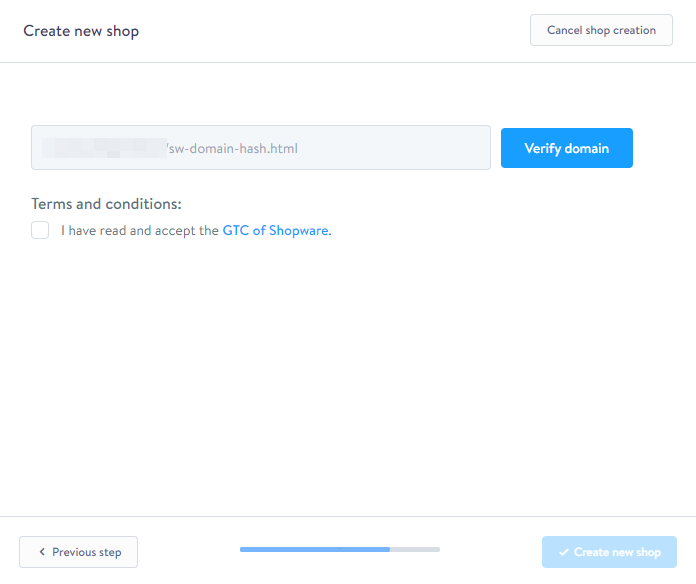
As always, you have to read and confirm the terms and conditions. Otherwise, you will never register your shop.
While creating a new cloud shop, Shopware requires specifying a shop name. You can check its availability and preview the domain.
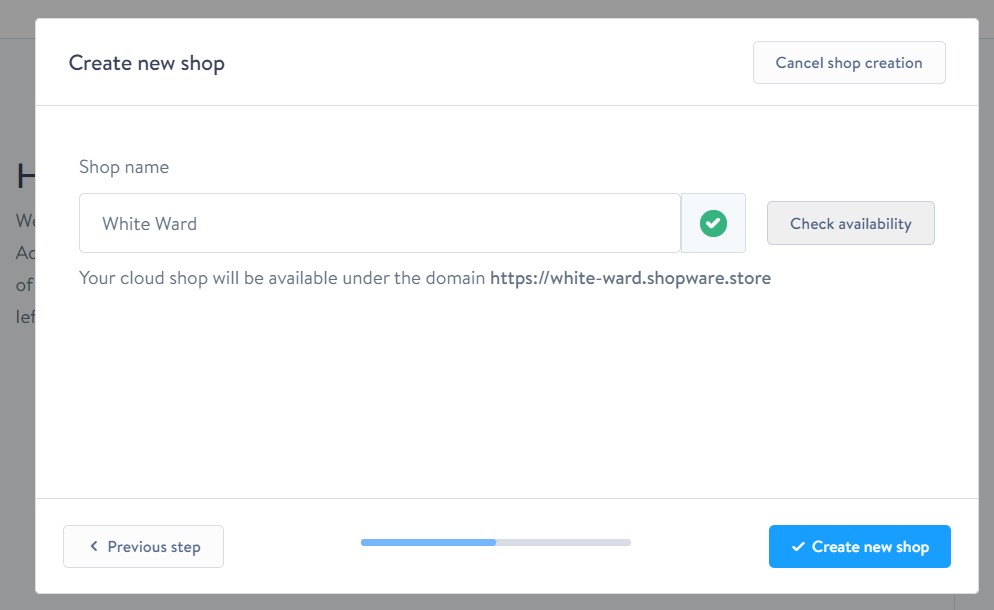
Hit the creation button, and Shopware will display the Changelog Merchant area. Your new cloud shop has been created.

How to add a payment method to a Shopware account
You cannot purchase chargeable plugins without depositing a payment method or pre-loading the account with the necessary credit. In the chapter below, we shed light on how to do that by adding a payment method to your Shopware account. Do that as follows:
- Log in to your Shopware Account;
- Proceed to Basic Information/Accounting;
- Choose PayPal, credit card, or direct debit as your payment method.
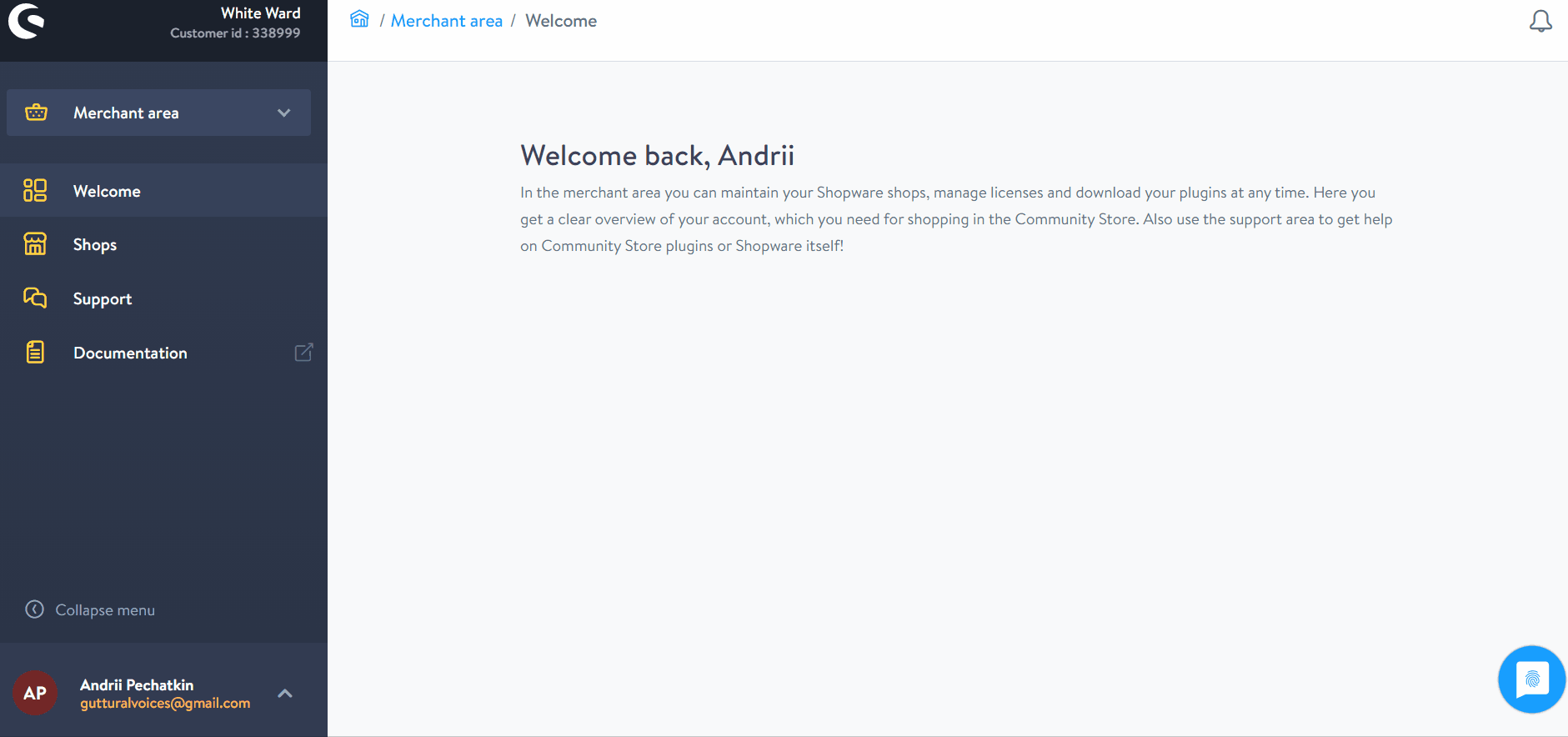
Consider the following restrictions:
- PayPal: Enter all the necessary information within the PayPal system. You will need to authorize “merchant debit with a debit agreement”. This procedure is similar to a direct debit authorization for your PayPal account. All further information is provided when you enter your payment data.
- Credit card: Payment by Mastercard and Visa are only possible. However, support for other credit cards should be added soon.
- Direct debit: Shopware supports only the SEPA BASIS direct debit from euro accounts.
After configuring all these methods, you get the ability to select one of them while purchasing extensions. Just choose one that suits your needs during the order completion in the store.
How to top up your Shopware account
If you want to pay in advance or need to balance an invoice, Shopware lets you pay any amount into your customer account. The minimum deposit is €5.00. You can make it per shop domain. You can add a deposit to your Shopwasre account as follows:
- Go to your Shopware account;
- Proceed to Merchant Area -> Shops;
- Open a shop to add funds to;
- Hit the Open Account Details button;
- Click Add funds to your account;
- Specify one of the payment methods added to the account;
- Type the amount you want to transfer to your shop.
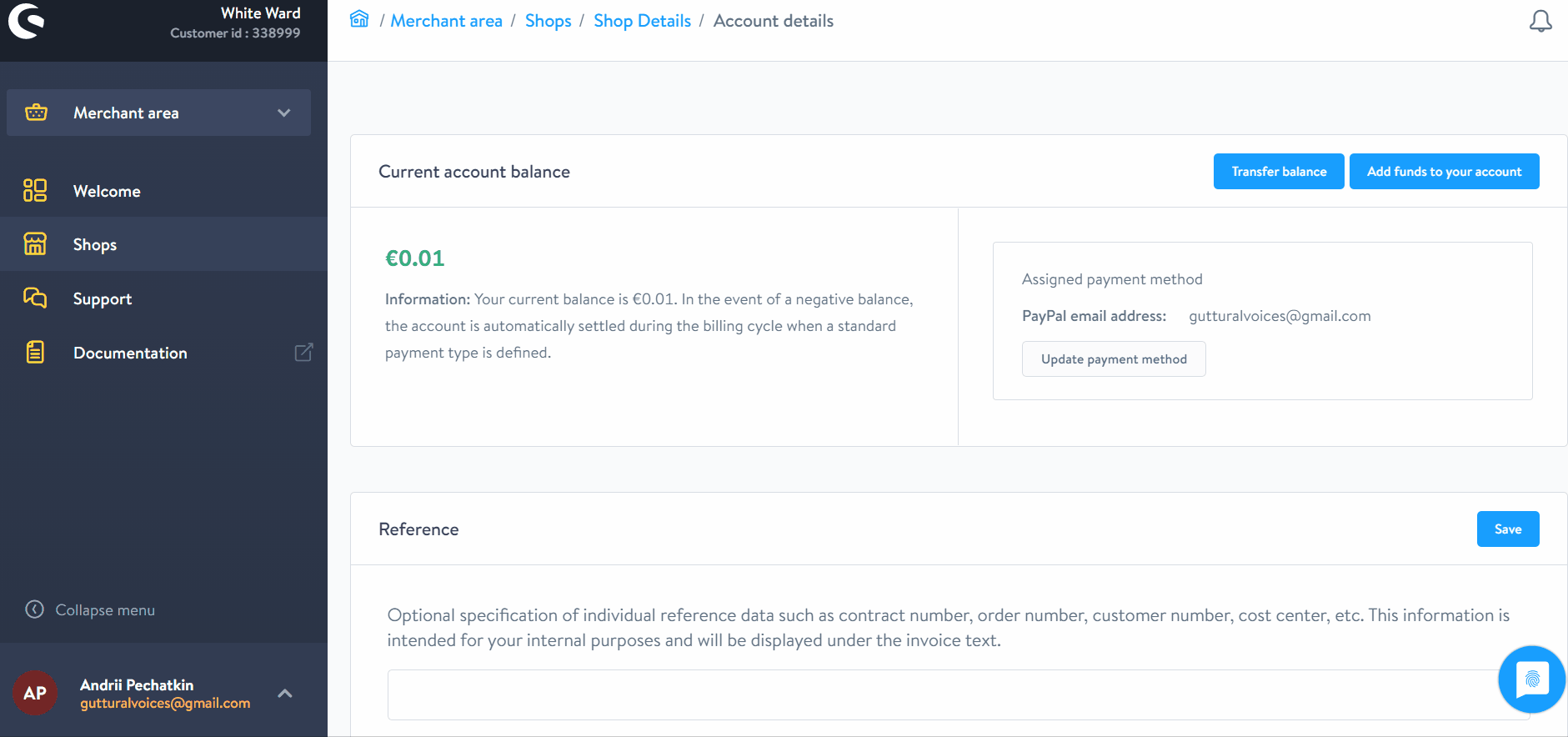
Besides, Shopware offers an alternative way to add a deposit to your customer account. You can make a PayPal payment to the following PayPal account: “financial.services@shopware.com”. You need to specify your customer number and domain to indicate the account to which you transfer the money.
How to purchase Shopware extensions
There are two ways to purchase Shopware extensions. Firstly, you can do that in the Shopware store. Secondly, it is possible to purchase them in the Plugin Manager.
In-store purchases
You can buy chargeable extensions on the Shopware marketplace only after you deposit a payment method in your account, as discussed above. Next, you need to follow these steps:
Proceed to the .
Use the navigation and search to find the extensions you are looking for. Use layered navigation on the left to filter out the selection of modules. Choose a Shopware version, extension category, rating, price range, etc. Note that the filters become more and more granular the more you configure them.
Click on the extension you want to purchase to proceed to its detail page.
The screen contains details about the extension. Besides, it lets you choose between a purchase, rental, or test version. Support information, manufacturer data, and other details are also listed here. Buying and downloading the extension is associated with a standard shopping cart experience:
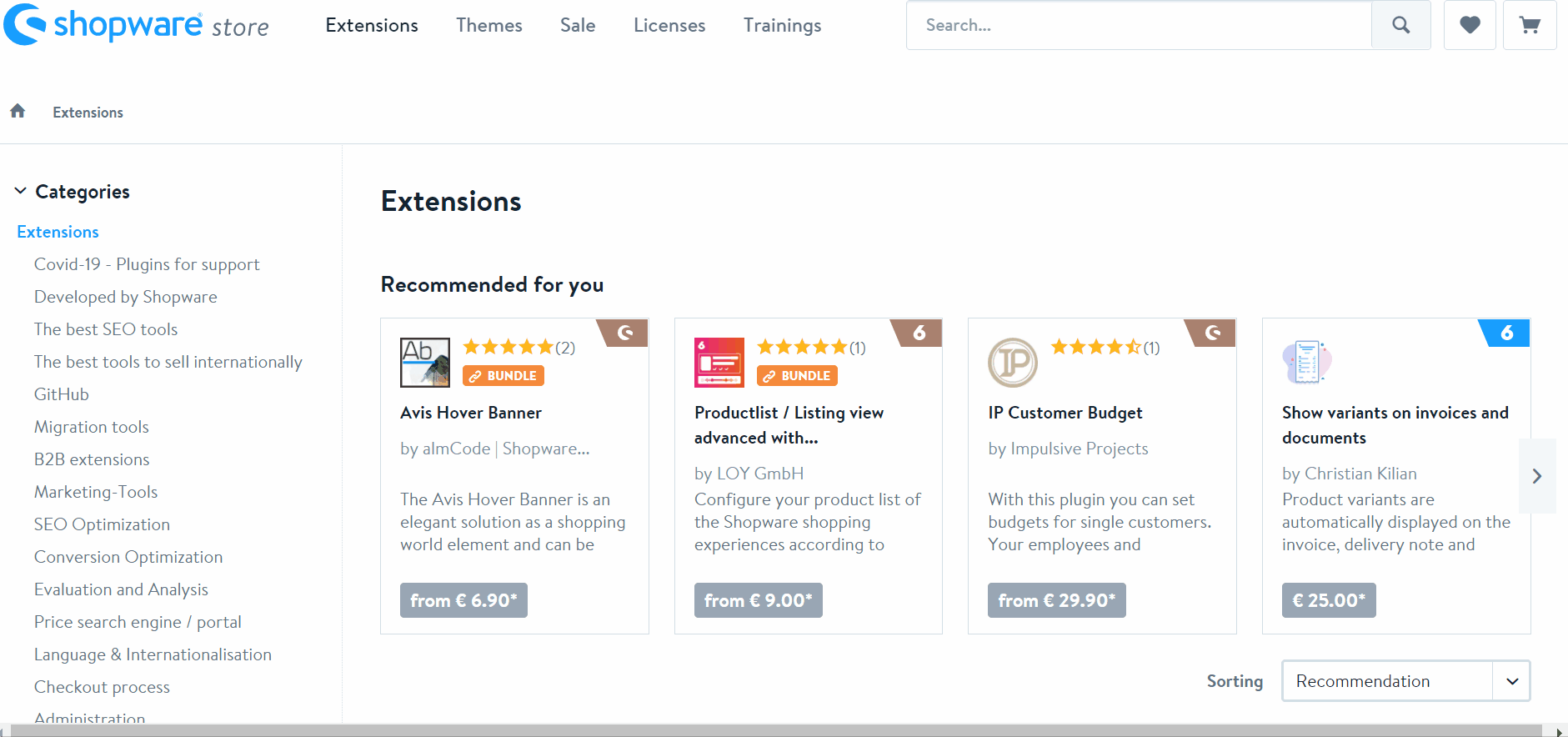
Now, when you are on the checkout page, it is necessary to double-check the details. Be especially careful with your booking domain and the licensed domain. If they are not correct, problems with billing may occur. Also, the purchased extension may not run in the intended shop due to incorrect domain licensing.
Note that the Shopware booking domain indicates a particular domain in your account to refer to during the booking.
Plugin Manager
Alternatively, Shopware lets you purchase plugins using the Plugin Manager. The tool not only makes it easier to purchase/download plugins but also notifies about expiring licenses and supports license renewals. You can start buying plugins in the Plugin Manager with the help of the search or navigating through the categories.
Click on a module to see the detail page. You can not only view additional information about the tool you are going to purchase but also select the right licensing model.
Hit the Buy Now button to put the extension to the cart. Log in to your Shopware account to proceed to the checkout page. Select the booking domain and complete the purchase.
Note that purchasing Shopware extension through the Plugin Manager selects the licensed domain automatically. You just need to choose the proper booking domain. Thus, you enable the correct debit operation.
If the purchase is successful, the plugin is downloaded directly. Alternatively, you can get the license and install the plugin directly. The newly-purchase extension is available under the Installed section of the Plugin Manager.
How to get support with a Shopware account, license, and products
Multiple ways to get support when you face issues with your Shopware account and license are at your service. Firstly, you can contact a sales team at info@shopware.com. Another way is to reach them by phone: +49 2555 9288 50.
All inquiries about accounting and financial services can be sent to financial.services@shopware.com. You can also make a call: +49 2555 9288 510.
If you have technical questions about Shopware, the situation is a little bit more complicated. The shopware support is only available for Professional Edition (PE) users. If you’ve chosen another version, please look for help at the or find a reliable service provider. For instance, the Firebear team can help you with data transfers and integrations. Contact us for more detail.
How to Import Any Data to Shopware 6
Although you cannot import your account or ID to Shopware, there are many more entities that can be transferred to your new storefront. You can dramatically improve the migration to Shopware 6 or integration with external systems due to automated data transfers. However, the platform doesn’t let you leverage this functionality by default. You need a third-party tool to run the migration or integration successfully. You can simplify and automate both processes with our . Contact our support for more details.
Shopware 6 Essentials FAQ
How to create a Shopware ID?
Create a Shopware account to get a Shopware ID. You can read the guide above to find more information on the purpose of a Shopware ID.
How to create a Shopware account?
You can create a new Shopware account on a registration page. Hit the Register Now link and fill in the required fields. Get the confirmation link in an email.
What is Shopware master data?
Shopware master data is your contact information, such as an address, email, phone, company name, etc. You provide this data upon registration.
How to add a shop in Shopware?
You can create a new Shopware shop in your merchant area. Just hit the corresponding link situated at the right section of your start-screen. The system lets you choose between a cloud storefront or an on-premise website. Specify information about your new Shopware Shop and save it.
How to add a payment method in Shopware?
You can add a payment method in your Shopware account under Basic Information -> Accounting. You can choose the following options: PayPal, credit card, or direct debit.
How to create a deposit in Shopware?
Shopware lets you pay in advance for your purchases. You can top up your account under MerchantArea -> Shops. Choose a shop to add funds to, click Open Account Details, and add funds there, following the detailed instructions.
How to purchase Shopware extensions?
You need to add a deposit to your Shopware shop to purchase extensions. After that, you can proceed to the Shopware Marketplace, choose tools you want to buy, and complete the purchase. Alternatively, you can do everything in the Plugin Manager. Read more information about this tool in this article.
How to get support in Shopware?
You can get support regarding your Shopware account and license at info@shopware.com or by phone – +49 2555 9288 50. Inquiries about accounting and financial services are accepted here: financial.services@shopware.com or +49 2555 9288 510.
How to migrate to Shopware 6?
Although migration to Shopware 6 is a complex topic, we can describe its basic aspects here. The most important thing about the Shopware 6 migration is that you cannot perform it with the default tools. You need a third-party extension that will automate data transfers as well as help you with different attribute standards. Use the Improved Import & Export tool for Shopware 6 to run the migration. Contact our team for more information.
How to automate import and export processes in Shopware 6?
If you regularly get data updates or need to provide information to external systems, use the Improved Import & Export extension for Shopware 6 to automate these procedures. Our solution lets you create a schedule of updates to run import or export processes automatically.
How to integrate Shopware 6 with external systems?
As we’ve already mentioned above, you need the Improved Import & Export extension for Shopware 6 to integrate your e-commerce website with external systems, such as ERP, CRM, accounting tools, etc. Our module not only automates import and export processes but also modifies data according to the requirements of your Shopware store upon import and the connected platforms upon export.




